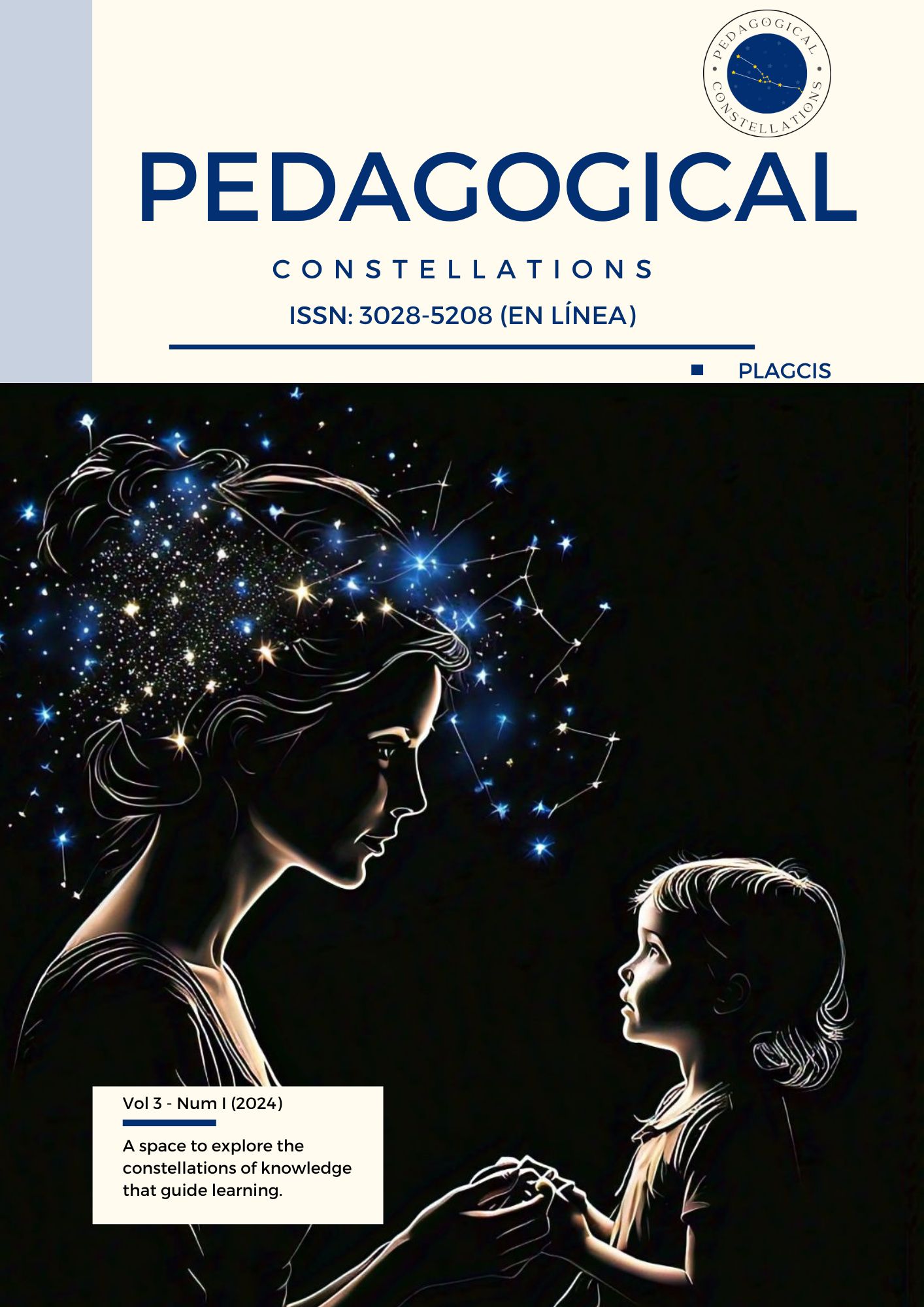Teacher Researcher: a Praxis of Continuous Research Training for the Strengthening of University Education
DOI:
https://doi.org/10.69821/constellations.v3i1.23Keywords:
Academic performance, gamification, higher education, learning, student motivationAbstract
The research training of university teachers is an unfinished process, therefore, continuous preparation is expected from the educator himself. The University is for society the center of knowledge production in favor of economic, political and social progress among others, to achieve a high quality education, universities need to strengthen the capabilities of research teachers by offering opportunities for reflection and research training. Based on ethical thinking and an integrative approach to education, teachers are the ones who transmit the nuances of the harmonious interaction between science, disciplines, technology and productivity, and the socio-cultural context. The task of university faculty, training and education, requires pedagogical discourse as a means of producing knowledge and forming people, citizens and professionals. Teachers provide students with the tools they need to know, interpret and understand the complex local, national and global realities, allowing them to reflect, critically intervene and participate in the processes of social change that leads to improving the quality of life of men and women in the educational environment. However, university teachers in their research activities show an activity detached from the areas of social demand, when doing research, they seek to obtain scientific achievements, obviating the reason for which they do research.
Downloads
References
Alanís Jiménez, J. F. (2018). Consideraciones para la formación continua de personal docente universitario. Revista Educación, 228–249. https://doi.org/10.15517/revedu.v42i2.25123
Ayala, R. (2018). La Metodología Fenomenológica - hermenéutica de M. Van Manen en el campo de la Investigación Educativa. Posibilidades y primeras experiencias. Revista de Investigación.
Campos Saborío, Natalia. (2003). Nuestra labor de mirar al otro. Revista Educación, 27(1), 231-232.
Contreras, F. A. G., & Maluk Uriguen, S. A. (2017). A descriptive analysis of university administration in Ecuador from the perspective of legislative change. Revista Electrónica de Investigación Educativa, 19(2), 22–37 https://doi.org/10.24320/redie.2017.19.2.866
Delors, J. (1996). La educación o la utopía necesaria. Informe a la UNESCO de la Comisión Internacional sobre la Educación para el siglo XXI. Ediciones UNESCO
De Souza Santos, B. (2005). La universidad en el siglo XXI. Para una reforma democrática y emancipadora de la universidad. México: Centro de Investigaciones Interdisciplinarias en Ciencias Humanas. Universidad Nacional Autónoma de México.
Flores Nessi, E. M., Loaiza Falcón, A. C., & Rojas de Ricardo, G. N. (2020). Rol del docente investigador desde su práctica social. Revista Scientific, 5(15), 106–128. https://doi.org/10.29394/scientific.issn.2542-2987.2020.5.15.5.106-128
GAMBOA, A.; VARGAS, R.; HERNÁNDEZ, C. Investigación formativa: Pretensiones curriculares y representaciones sociales de actores educativos en el programa de Enfermería de la Universidad Francisco de Paula Santander - Cúcuta, Colombia. Universidad y Salud, v. 19, n. 1, p. 60-66, 2017. https://doi.org/10.22267/rus.171901.69
Martínez, M. (2006) Ciencia y arte en la metodología cualitativa. Editorial Trillas. México.
Morales, N. (2015). Praxis investigativa emergente: Una reflexión basada en las referencias verbales de los docentes de la Universidad Nacional Experimental Politécnica de la Fuerza Armada (UNEFA). Revista electrónica de investigación y postgrado: Nexos, 4(1). http://nexos.unerg.edu.ve/portal/phocadownload/ene-abr-2015/03_praxis_investigativa_emergente.pdf
Palencia, M. (2023). Procesos cognitivos en la Formación Permanente del docente de Educación inicial: Más allá del autoaprendizaje. Revista crítica con Ciencias, 1(1). https://doi.org/10.0000000510822267
Ramírez Tulio (2022) Foro inaugural Desafíos de la Investigación en Venezuela y Latinoamérica: Distintas Miradas. XII Congreso de Investigación y Creación Intelectual. https://www.unimet.edu.ve/debatieron-los-desafios-de-la-investigacion-en-venezuela-y-latinoamerica/UNESCO (2015). Replantear la educación ¿Hacia un bien común mundial? Paris.
Reiban, R., De la Rosa, H., & Zeballos, J. (2017). Competencias investigativas en la Educación Superior.Competencias investigativas en la Educación Superior Revista Publicando, 4(10),395–405. http://scielo.sld.cu/scielo.php? script=sci_arttext&pid=S2218-36202018000400075
Rodríguez, Luz. (2011). Competencia docente, investigación educativa y calidad en educación: ¿Cómo se relacionan? http://www.odiseo.com.mx/bitacoraeducativa/2011/04/competencia-docente-investigacion-educativa-calidad-educacioncomo-se-rel#sthash.iBzOfRP2.dpuf.
Rodríguez, L. A., Escobar, M. C., Aveiga, V. I., & Durán, U. C. (2019). Formative strategy and development of the teaching competence named managing the family educational orientation, in junior high school education Information Technological, 30(6), 277–288. https://doi.org/10.4067/S0718-07642019000600277
Romero, H., Tobis, M., Jinete, M. y Lindo, M. (2006). La praxis profesional del docente en formación. En revista Iberoamericana de Educación. OEI. N° 10/5
Sandín, M. (2003). Investigación Cualitativa en Educación. Fundamentos y Tradiciones. Madrid: Mc Graw Hill
Tinoco-Cuenca, N. P., Damián-Nuñez, E., Isla-Alcoser, S., & Bedoya, M. A. M. (2020). Competencias de investigación e impacto socioeducativo en los trabajos de titulación de una universidad de Ecuador. Propósitos y Representaciones, 8(0). https://doi.org/10.20511/PYR2020.V8N3.442
Downloads
Published
Issue
Section
License
Copyright (c) 2024 Doris Oraida Morón Desantiago (Autor/a)

This work is licensed under a Creative Commons Attribution 4.0 International License.
Authors who publish with this journal agree to the following terms:
- Authors retain copyright and grant the journal right of first publication with the work simultaneously licensed under a Creative Commons Attribution License 4.0 that allows others to share the work with an acknowledgement of the work's authorship and initial publication in this journal.
- Authors are able to enter into separate, additional contractual arrangements for the non-exclusive distribution of the journal's published version of the work (e.g., post it to an institutional repository or publish it in a book), with an acknowledgement of its initial publication in this journal.
- Authors are permitted and encouraged to post their work online (e.g., in institutional repositories or on their website) prior to and during the submission process, as it can lead to productive exchanges, as well as earlier and greater citation of published work.




